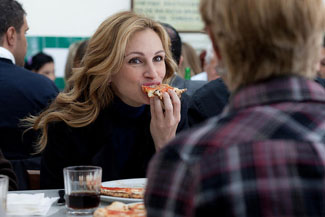|
|
Book vs. Movie: Eat Pray LoveBy Russ BickerstaffAugust 18, 2010
Through her numerous commercial successes, Gilbert seems to have forgotten that Just Because Something Happened To You Does Not Automatically Make It Interesting. The big flaw with this criticism of Gilbert is, of course, the fact that enough people have found it interesting to make it a best-seller that’s being turned into a big-budget motion picture. Judging from its textual make-up, however, it seems destined to be forgotten as pop culture climbs into the next decade. Autobiographical works tend to be much more enduring when the author has accomplished something beyond the autobiography. We’re still waiting for more from Gilbert - something that isn’t at least partially self-absorbed…and, in and of itself, being self-absorbed is not necessarily a bad thing. The problem with Eat, Pray, Love is that it aggressively lacks any meaningful insight into the nature of self-discovery amongst the wealthiest people on the planet at the dawn of the 21st century. The lengths to which people go to try to find themselves can be interesting, but Gilbert doesn’t spend enough time away from the mirror to provide any kind of insight into her own experiences. As a result, the book is pretty lifeless. The Movie The film features 43-year-old Julia Roberts as 32-year-old Elizabeth Gilbert. Roberts has a screen presence that absolutely exudes affability. Director Ryan Murphy (who is also credited with work on the screenplay) seems to recognize this and let an audience’s natural tendency to like Julia Roberts take over. It works surprisingly well.
[ View other columns by Russ Bickerstaff ]
[ View other Book vs. Movie columns ]
[ Email this column ]
|

|
|
|

|
Friday, November 1, 2024
© 2024 Box Office Prophets, a division of One Of Us, Inc.


